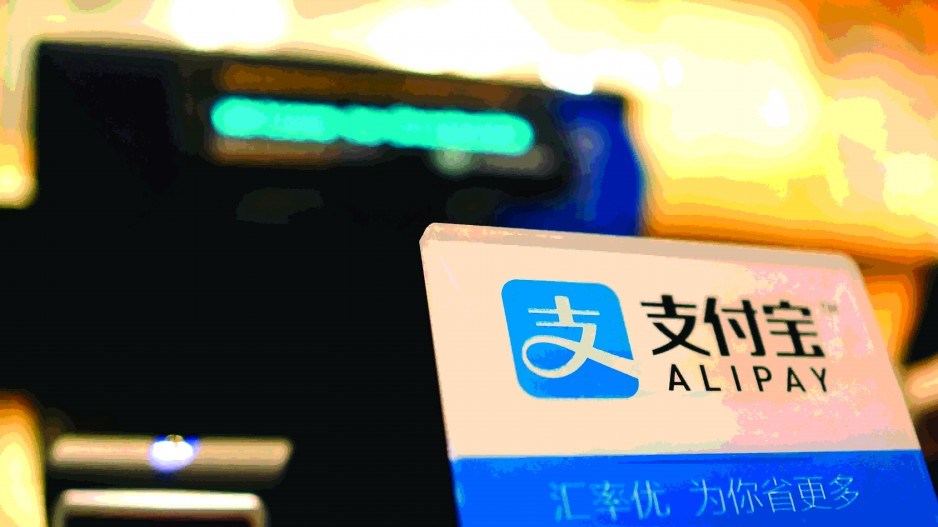While Alipay has grown rapidly in its first year of Canadian operations, the Chinese e-payment giant plans to focus on the spending patterns of tourists, students and other consumers from China, rather than potential local consumers.
But even if a North American “wallet” app may not be on the near horizon for those hoping to use Alipay – the world’s largest platform of its kind – in B.C. without a Chinese bank account, officials from the company said Canadian businesses can still benefit from the Alipay platform by using it to gain access to Chinese consumers who are otherwise less likely to spend their discretionary income during their Canadian visits.
“I just think that people here don’t understand the scale of this, of just how ubiquitous e-payment
is in China,” said Chenni Xu, the New York-based North American corporate communications manager for Ant Financial, the official corporate moniker of the platform linked to Chinese tech giant Alibaba Group (NYSE:BABA).
“The fact is, in China, this is a lifestyle app. People pay their utilities through it. They get
their taxis through it. They buy movie tickets and everything else with it, and when they come here, we really see Alipay as a superhighway to the Chinese consumer.”
2018 was named the Canada- China Year of Tourism by officials of both countries, and Vancouver is expecting to see as many as 333,191 overnight visitors from China this year. Other Canadian cities are also expecting similar spikes; Montreal, for example, is projecting a Chinese visitor count of 142,233 this year, up almost 20,000 from last year.
Alipay, whose Canadian head office is located in Vancouver, has 900 million users globally and occupies about half of China’s enormous, trillion-dollar electronic- wallet sector. The company is locked in a heated battle for market share with Tencent Holdings Ltd.’s WeChat Pay platform, and the two e-payment apps combined are Chinese citizens’ go-to payment choice, with many consumers forgoing physical wallets in favour of using their mobile phones for purchases.
A Nielsen report in February found that more than 90% of Chinese tourists going abroad to travel would use mobile payment methods like Alipay to buy things if the option were available. Alipay’s
Xu said the report is clear evidence that if western businesses, including those in B.C., were to start accepting Alipay, they would likely capture more Chinese business.
“In a lot of cities in China like Hangzhou, where our company is headquartered, it is really completely cashless,” Xu said. “So if you are in a taxi and you try to give the driver cash, he or she will wonder, ‘Where did you just come from?’ and ‘What are you doing?’… The fact is, consumers expect this, because they are using Alipay like their wallets in China. So having Alipay just makes it so much more convenient for them to spend and consume.”
Since opening its office in Vancouver in January, Alipay has built a base of 180,000 North American merchants who now accept Alipay as a method of payment. The latest addition came in November, when 7-Eleven became the first Canadian convenience retailer to jump into the fray, adding Alibaba’s payment platform along with WeChat Pay to 25 stores in Metro Vancouver.
In a written statement, 7-Eleven Canada spokeswoman Laurie Smith said the company isn’t ruling out adding Alipay to more stores as demand sees fit: “As a private company, we do not release financial or strategic information, but we are focused on supporting the needs of tourists and the Chinese community in the Vancouver Greater Area and beyond. This initial rollout will determine next steps and how we can continue to enhance the experience of our customers.”
Another major recent announcement came in August, when Air Canada (TSX:AC) launched Alipay and WeChat Pay options on flight bookings for the airline’s Canadian/North American and Hong Kong websites. This happened after consumer demand far exceeded Air Canada’s expectations when the company opened Alipay/WeChat Pay options for the air carrier’s Chinese website in fall 2017.
“These proved wildly popular – such payments grew some 300% [year-over-year] – moving us to recently expand acceptance of Alipay and WeChat Pay to include Hong Kong and North America,” Air Canada said in a written statement at the time of the announcement.
“This is another important element of our global expansion strategy as we increase our focus on providing our international customers with their preferred method of payment when purchasing outside China.”
Other retailers that have signed on with Alipay, either directly or through a partner firm such as Ottawa-based Motion Pay, include Holt Renfrew, Maison Birks jewellers and Tourism Richmond.
Alipay has also been aggressively expanding beyond China as competition with WeChat Pay heats up. The company has nine “local wallet” apps in markets like Hong Kong, India and Southeast Asia, where these joint ventures allow consumers to register with Alipay using accounts at their local banks and financial institutions instead of Chinese ones. But Xu said there are no announced plans for a North American wallet app yet, so the focus will remain on consumers with financial ties to China’s banking system.•




